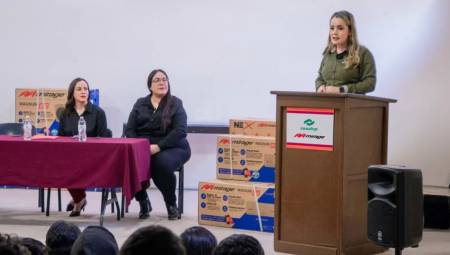Carlos Sebastián, Professor of Fundamentals of Economic Analysis at the Complutense University of Madrid and director of Abengoa, has made it clear that the current energy model is "unsustainable", although "change is possible", and points to some guidelines that are aimed at technological development and the transmission to citizens and economic agents of "the true costs of energy alternatives".
Sebastián made these statements at the inauguration of the School of Energy and Climate Change which, under the title 'What energy model?', is organized once again by the Focus-Abengoa Foundation and the Menéndez Pelayo International University (UIMP) at the Hospital de los Venerables until May 26.
The opening ceremony was also attended by the president of the European University Institute, Josep Borrell; Daniel Villalba, Professor of Business Organization at the Complutense University of Madrid and Director of Abengoa; Fernando Luis de Saavedra, director of the Rector's Office and International Relations of the Menéndez Pelayo International University (UIMP); Patrocinio Rodríguez Ramos, director of the UIMP in Seville; José Domínguez Abascal, technical general secretary of Abengoa, and Anabel Morillo León, general director of the Focus-Abengoa Foundation.
After the inauguration, Carlos Sebastián, has presented the program of the course that, under the title 'What energy model?' aims to deepen the difficult challenge of configuring an energy model with guarantees of the future. In addition, throughout the course, those deficiencies that, in terms of sustainability, the current energy model has will be reviewed, and the technological conditions and the political and institutional developments necessary for this energy transition to be possible will be submitted to debate.
The director of this edition, Carlos Sebastián, has made a brief review of the panorama of the current energy model and its conditions and future forecasts. Thus, he recalled that the current energy model is "unsustainable, because it depends largely on resources that are in limited quantities in nature".
In addition, it is "afflicted by other serious problems" such as "the environmental impact, which could have serious consequences on living conditions on our planet, and insecurity in supply, with its ability to cause serious interruptions in the functioning of the economic system."
Attending to the development of new technologies in the energy transformation and in the most efficient use of energy, Professor Sebastián has optimistically stressed that "the change of the energy model is possible" and that "the main lines run in two directions: technological development and transmission to citizens and economic agents of the true costs of energy alternatives". Lines on which this edition of the School of Energy and Climate Change of the Focus-Abengoa Foundation - UIMP has focused its program.
Following Carlos Sebastián's speech, Professor Ricardo Hausmann, director of the Center for International Development at Harvard University and member of Abengoa's International Advisory Board, gave the inaugural lecture entitled 'Biofuels seen from the South: impacts on development'.
This Monday's meeting between the heads of the Focus-Abengoa Foundation and the Menéndez Pelayo International University served to sign the renewal of the collaboration agreement between the two institutions, which since 2004 has materialized in the organization of two schools with triennial programming, which develop their programs and activities during the fall and spring, at the Hospital de los Venerables, turning the headquarters of the Foundation into a forum for meeting and reflection, developed by professors and researchers of international rank.
The School is part of the Focus-Abengoa Forum on Energy and Climate Change, which aims to promote, through public debate actions, an open forum for research, exhibition and confrontation of ideas and results through as many actions as deemed relevant at any time according to the nature of the issues to be analyzed. In addition, the School seeks to promote a sufficiently broad and flexible debate, so that it can welcome and contrast as many alternative initiatives as deemed appropriate in relation to renewable energies and all aspects related to climate change. (EUROPA PRESS)
Recommend on FacebookShare on technoratiTweet about itSubscribe to the comments on this postBookmark in BrowserTell a friendAuthors: admin













